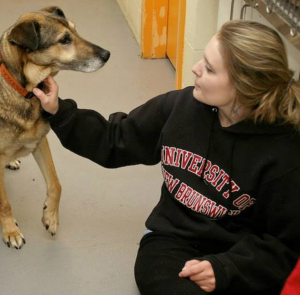By Victoria, FSPCA Animal Technician
Socialization is Important at all Ages
The 3-week to 3-month age range is an important socialization period in a dog’s life. This is when puppies bond with other animals and individuals. They learn that objects, people, and environments are safe, and what body signals mean. It’s important as a dog’s owner to teach your pup all of these things at this young age so they will stick. Also, puppies that do not receive the proper socialization during this time span tend to be more fearful.
Although it’s important to socialize your pup as early as possible, in some circumstances, you don’t have that opportunity. Whether you get a puppy at 8-12 weeks old, or an older dog from a friend or an adoption center, it is still important to socialize them to the best of your ability with the knowledge you have of their past. One of the hardest things about working in an adoption center is seeing animals come through the doors that weren’t socialized. When they are in a kennel or around strangers, they’re not as friendly or calm as others which makes it harder to adopt them out. Also, dogs that are not socialized are more likely to bite, so it is best to continuously socialize your dog.

What the FSCPA Does for Socialization
The training we do at the Fredericton SPCA for socialization starts with focusing on a specific dog. We get them used to new faces, the kennel area, and the outside dog run. Gaining their trust is an important part of helping the dogs become adoptable. We also do a lot of walking outside, where there are no walls and they don’t feel as trapped. If a certain dog is nervous of meeting strangers, we’ll get our regular volunteers to help with socializing. For example, we will get a volunteer to stand outside without making eye contact with the dog, and we will continuously walk the dog past the stranger, with positive rewards. The main thing is taking it day-by-day and being extremely patient. We also do regular “dog exams”, which means we have one on one time in the kitchen, and work on playing with their paws and getting nail clippers out and giving them a positive reward whenever they smell or touch the clippers. Regular things like this will help a dog when they need to go to the vet or for nail trims. The key is practicing this regularly so the dog does not forget.
Another important part of socializing is dog-to-dog interaction. The staff at the FSPCA does a lot of work with the dogs to get them used to other canines. There are many ways we do this, but first, we introduce the dogs through a fence outside. We’ll monitor their behavior and if they seem to be okay with each other, we continue the introduction inside a fenced in area until they are 100% comfortable with one another.
Key Takeaways
The best way to socialize a dog is by knowing their boundaries and never forcing them to interact with something or someone they show hesitation towards. You never want to make it a bad experience because that can back track their progress. It is important to socialize your dog with children, other dogs, other animals (livestock too), different noises and textures (loud machinery, vacuums, wet grass, parks). A great exercise to help socialize your dog can be done by touching their pads and feet for nail trims. Also, bringing your dog regularly to the vet to just get used to the environment and different smells is a great way to make them more comfortable. Finally, the most important thing to remember when socializing your dog is consistency, patience and positive rewards.
